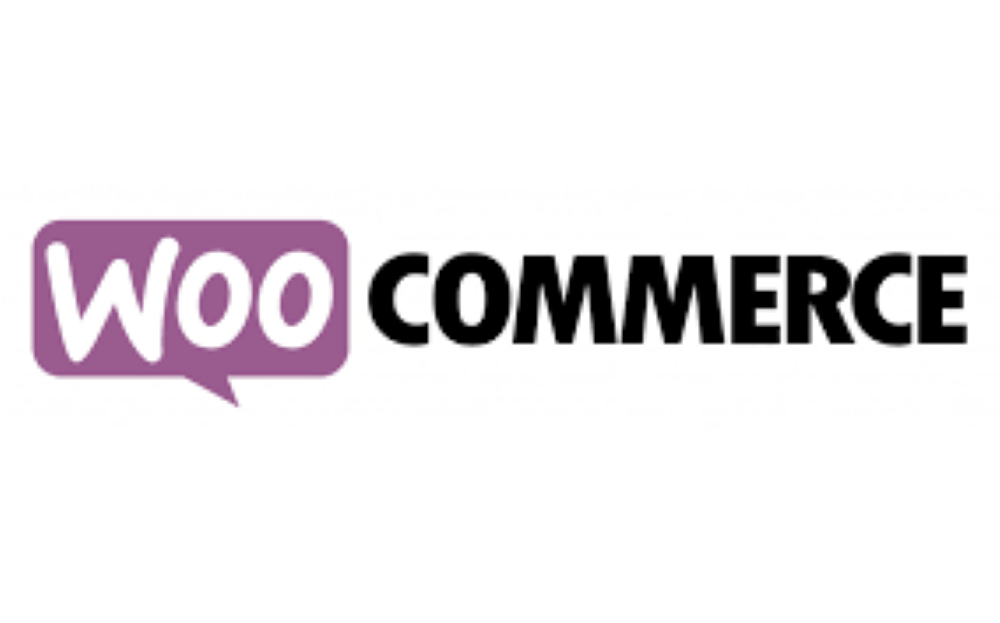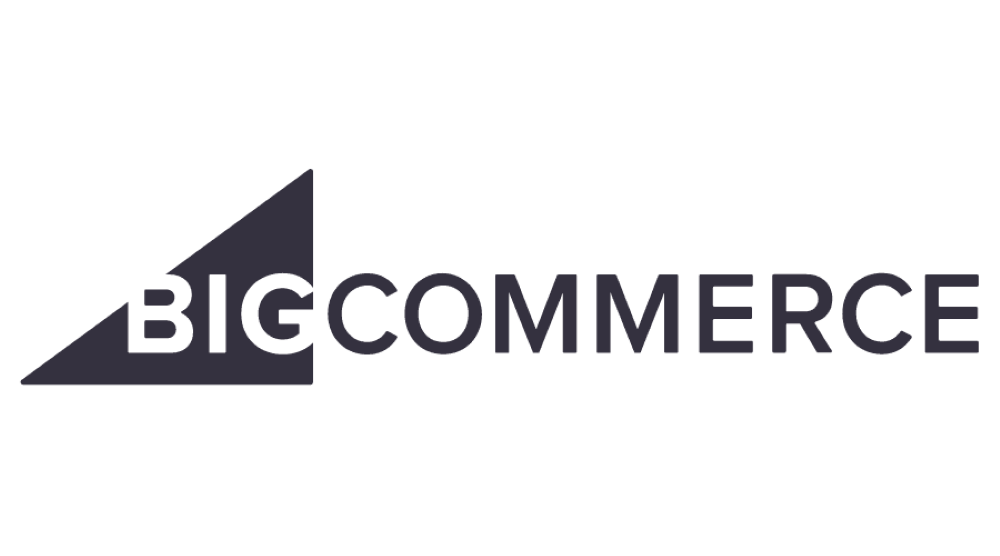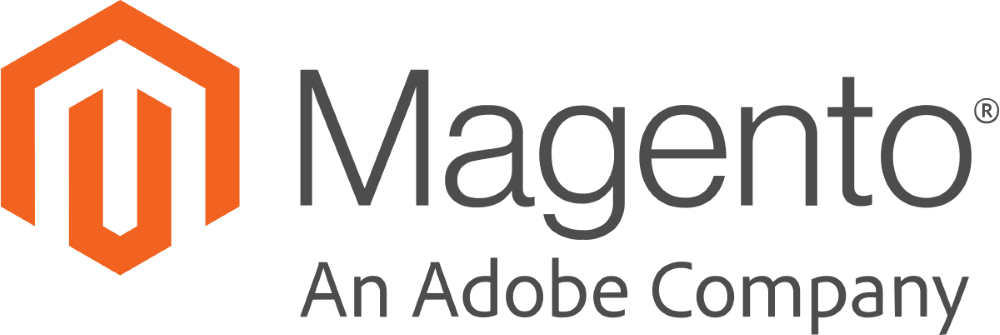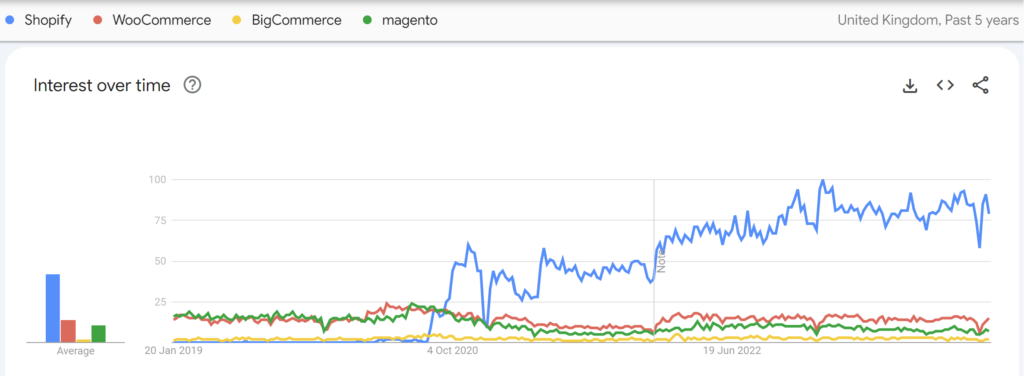Enjoy our overview of popular e-commerce platforms in the UK, including Shopify, WooCommerce, BigCommerce and Magento – along with their pros and cons. Please note that the popularity and features of these platforms can vary between different sized retailers. This isn’t a one size fits all approach – in truth they are all great platforms! However all retailers and more importantly products aren’t the same so read on to find out which platform best suits your needs.
* Caveat – choosing an ecommerce platform for a new business is a different consideration to re-platforming. We’ll finish with our considerations for moving from one ecommerce eco-system to another.
Shopify & Shopify Plus

Pro’s:
- User-friendly: Shopify is known for its user-friendly interface, making it easy for beginners to set up and manage their online stores.
- Hosting included: Shopify provides hosting, reducing the need for users to manage server-related tasks or deal with outsourcing server management to another 3rd party service.
- Extensive app store: It has a vast library of apps and plugins to add functionality to your store. However this can be the limitation of the platform – if you are a scaling business, 3rd party apps and integrations there of can become cumbersome and they all come with a subscription fee.
- Excellent customer support: Shopify offers 24/7 customer support.
- Strong mobile responsiveness: The platform is optimised for mobile devices.
Con’s
- Transaction fees: For users who don’t use Shopify Payments, additional transaction fees apply. Owning a Shopify store is a rental service of which you have little to no control over costs and the initial price increases.
- Limited customisation: While customizable, Shopify may have limitations compared to other platforms.
- Monthly costs: Shopify has a monthly subscription fee, which may be expensive for small businesses.
“Although marketed as a no code/low code platform you are likely to require web development support for front end customisations and UX conversion rate optimisation changes. Shopify stores out the box can be uniform and unless you want your site to be like every other store you will need to make design changes!“
An ecommerce managers perspective
View Shopify here: https://www.shopify.com/uk – View Shopify Plus here: https://www.shopify.com/uk/plus
Shopify stores typical turnover would be in the region of 300k to 5M, Shopify Plus is for any size of retailer but does propose scale limitations in comparison to Magento
WooCommerce (WordPress Plugin)

Pros:
- Free and open-source: WooCommerce is a plugin for WordPress, making it cost-effective.
- Highly customisable: You have full control over your website’s design and functionality. Although you will need a web developer to assist with customisations.
- Strong SEO capabilities: Integrates well with SEO plugins for better search engine optimisation.
- Wide range of themes and plugins: Thousands of themes and plugins are available to enhance your store.
Cons:
- Requires hosting: You need to manage your own hosting, which can be more technical for beginners.
- Potential compatibility issues: As it’s a plugin, conflicts with other plugins or updates may occur.
- Maintenance: Regular updates and maintenance are necessary for optimal performance.
View Woo Commerce here: https://woo.com/
Typical turnover for Woo Commerce stores would be in the 100k to 1M bracket but the platform is not considered scalable and can become cumbersome when turnover and feature requirements increases.
BigCommerce:

Pros:
- Scalability: BigCommerce is suitable for businesses of all sizes and offers various plans.
- Built-in features: Many e-commerce features are included in the platform without needing additional plugins.
- Multi-channel selling: Integrates with various sales channels, including Amazon and eBay.
- Strong SEO tools: BigCommerce offers robust SEO capabilities.
Cons:
- Learning curve: It may take some time to fully grasp the platform’s features.
- Limited free themes: Compared to WooCommerce or Shopify, BigCommerce has fewer free themes.
- Pricing: It can be more expensive for high-volume businesses.
View Big Commerce here: https://www.bigcommerce.co.uk/
Typical turnover of a Big Commerce store is 750K to 10M
Magento 2 (Adobe Commerce):

Pros:
- Highly customisable: Magento offers extensive customisation options, making it suitable for large enterprises.
- Scalability: Can handle high volumes of products and traffic. Bult from the ground up to handle multi store front which means this is the application of choice for B2B or international expansion.
- SEO-friendly: Magento is known for its strong SEO capabilities.
- Open-source: Provides flexibility and access to a wide developer community.
Cons:
- Complex setup: Requires technical expertise and hosting management.
- Costly: Implementation, maintenance and hosting costs can be high.
- Heavy system requirements: It requires substantial server resources, demanding dedicated Magento hosting!
View Magento (Adobe Commerce) here: https://business.adobe.com/uk/products/magento/magento-commerce.html
Turnover of Magento and Adobe Commerce stores can vary widely, starting at 500K but typically retailers on this platform are turning over in excess of 2M with 5M plus the norm.
Why Shopify has gained more popularity over the last five years:
- User-Friendly: Shopify’s simplicity attracts beginners and entrepreneurs without technical backgrounds.
- App Store: The extensive app store allows users to customize their stores easily.
- Marketing and Support: Shopify invests in marketing and offers excellent customer support.
- Mobile-First Approach: It focuses on mobile responsiveness, crucial in today’s e-commerce landscape.
- International Expansion: Shopify has expanded globally, making it accessible to businesses in various countries.
Please check the latest reviews and updates for the most current information about these e-commerce platforms, as the market is constantly evolving.
Need help selecting your ecommerce store platform or just need some impartial guidance: email Digital Munro

